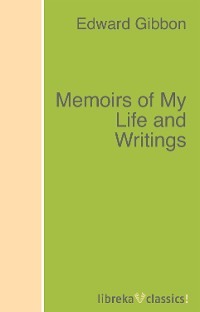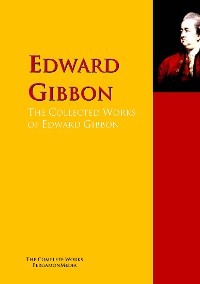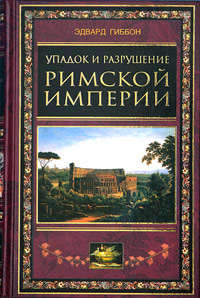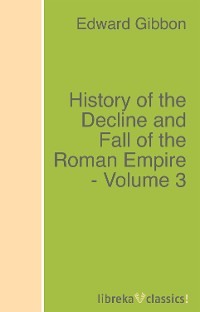 полная версия
полная версияPrivate Letters of Edward Gibbon (1753-1794) Volume 1 (of 2)

Edward Gibbon
Private Letters of Edward Gibbon (1753-1794) Volume 1 (of 2)
INTRODUCTION BY THE EARL OF SHEFFIELD
The centenary of the death of Edward Gibbon (died January, 1794, aged fifty-six) was recorded by a public commemoration held in London in November, 1894, at the instance of the Royal Historical Society. The distinguished committee of English and foreign students, who were associated on that occasion, invited me to become their President, as representing the family with which Gibbon had been so intimately connected, and which still retained the portraits, manuscripts, letters, and relics of the historian. The exhibition of these in the British Museum, and the commemoration held on November 15, reawakened interest in the work and remains of one of the greatest names in English literature; and a general desire was expressed that the manuscripts should be again collated, and that what was yet unpublished might be given to the world.
As is well known, it was my grandfather, the first Earl, who made the historian almost his adopted brother, gave him a home both in town and in country, was his devisee and literary executor, and edited and published the famous Autobiography, the letters, and remains. All of these passed under Edward Gibbon's will to Lord Sheffield; and, together with books, relics, portraits, and various mementos, they have been for a century preserved by my father and myself with religions care and veneration in Sheffield Park. The original autograph manuscripts of the Memoirs, the Diaries, Letters, Note-books, etc., have now become the property of the British Museum, subject to the copyright of all the unpublished parts which was previously assigned to Mr. Murray. And it is with no little pleasure and pride that I have acceded to the request of the publishers that I would introduce these unpublished remains to the world, and thus complete the task of editing the historian, to which my grandfather devoted so great a portion of his time, not only as a testamentary duty, but as a labour of love.
The connection of the historian with my grandfather, his early friend, John Holroyd, and the members of the Holroyd family, forms one of the pleasantest and also most interesting passages in literary history. It was in no way interrupted by Lord Sheffield's public and official duties; it was continued without a cloud to obscure their intimacy, until it was sundered by death; and the Earl, who survived his friend so long, continued to edit and to publish the manuscripts left in his hands for some twenty years after the death of the historian.
By a clause in the will of Edward Gibbon, dated July 14, 1788, his papers were entrusted to Lord Sheffield and Mr. John Batt, his executors, in the following terms: —
"I will that all my Manuscript papers found at the time of my decease be delivered to my executors, and that if any shall appear sufficiently finished for the public eye, they do treat for the purchase of the same with a Bookseller, giving the preference to Mr. Andrew Strahan and Mr. Thomas Cadell, whose liberal spirit I have experienced in similar transactions. And whatsoever monies may accrue from such sale and publication I give to my much-valued friend William Hayley, Esq., of Eastham, in the County of Sussex. But in case he shall dye before me, I give the aforesaid monies to the Royal Society of London and the Royal Academy of Inscriptions of Paris, share and share alike, in trust to be by them employed in such a manner as they shall deem most beneficial to the cause of Learning."
In pursuance of the directions contained in the will and of many verbal communications, Lord Sheffield, in 1799, published the Miscellaneous Works of Edward Gibbon, with Memoirs of his Life and Writings, in 2 vols., 4to. A third volume was added in 1815, and a new edition of the whole, with additions, appeared during the same year in 5 vols., 8vo. In 1837 another edition, in one large 8vo volume, was published.
By a clause in his own will, Lord Sheffield directed that no further publication of the historian's manuscripts should be made.
"And I request of my said trustees and my heirs that none of the said manuscripts, papers, or books of the said Edward Gibbon be published unless my approbation of the publication be directed by some memorandum indorsed and written or signed by me. And I also request the person entitled for the time being to the possession thereof not to suffer the same to be out of his possession or to be improperly exposed."
This direction has been strictly followed by my father, the second Earl, and by myself; and it is believed that no person has ever had access to any of the manuscripts for any literary purpose, excepting the late Dean Milman, who, when editing his well-known edition of the Decline and Fall, in 1842, was permitted to inspect the original manuscripts of the Autobiography, on condition of not publishing any new matter.
The commemoration of 1894, however, again raised the question whether such an embargo on giving to the world writings of national importance was ever meant to be, or even ought to be, regarded as perpetual. Whilst persons named in these papers or their children were living, whilst the bitter controversies of the last century were still unforgotten, whilst the fame of Edward Gibbon had hardly yet become one of our national glories, it was a matter of good feeling and sound judgment in Lord Sheffield to exercise an editor's discretion in publishing his friend's confession and private thoughts. Now that more than a hundred years have passed since his death, no such considerations have weight or meaning. And the opinion of those whom I have consulted, both professionally and as private friends, amply corroborates my own conclusion, that it is a duty which I owe to my own ancestor and to the public to give to the world all the remains of the historian which for more than a century have been preserved in the strong room of Sheffield Park.
The unlocking of the cases in which these manuscripts were secured was quite a revelation of literary workmanship, and has led to a most interesting problem in literary history. The manuscripts of the historian are all holographs – the text of the famous Memoirs being written with extraordinary beauty of calligraphy, and studied with the utmost care. But, singularly enough, none of the texts are prepared for immediate, or even direct, publication. The historian wrote, at various intervals between 1788 and 1793, no less than six different sketches. They are not quite continuous; they partly recount the same incidents in different form; they are written in different tones: and yet no one of them is complete; none of them seem plainly designed to supersede the rest. There is even a small seventh sketch, from which one of the noblest and most famous passages that Gibbon ever wrote has been excised, and inserted in the published Autobiography.
Lord Sheffield executed his editorial task with extreme judgment, singular ingenuity, but remarkable freedom. He was assisted in preparing the manuscripts for publication by his wife and by Lady Maria Holroyd, his eldest daughter, who became by marriage the first Lady Stanley of Alderley. This very able and remarkable woman, of whose abilities the historian expressed in letters his great admiration, evidently marked the manuscripts in pencil handwriting (now recognized as hers) for the printer's copyist. These pencil deletions, transpositions, and even additions, correspond with the Autobiography as published by Lord Sheffield. Quite a third of the whole manuscript is omitted, and many of the most piquant passages that Gibbon ever wrote were suppressed by the caution or the delicacy of his editor and his family.
The result is a problem of singular literary interest. A piece, most elaborately composed by one of the greatest writers who ever used our language, an autobiography often pronounced to be the best we possess, is now proved to be in no sense the simple work of that illustrious pen, but to have been dexterously pieced together out of seven fragmentary sketches and adapted into a single and coherent narrative. The manner and the extent of this extraordinary piece of editing has been so fully explained in the address of November 15, published by the Centenary Committee, that it is not necessary for me to enlarge upon it further.
No sooner had the discovery of the process by which Gibbon's Autobiography had been concocted been made public, than a general desire was expressed to have the originals published in the form in which the historian left them. It was no case of incomplete or illegible manuscripts, nor of rough drafts designed only as notes for subsequent composition. The whole of the seven manuscripts are written with perfect precision; the style is in Gibbon's most elaborate manner; and each piece is perfectly ready for the printer – so far as it goes. It was impossible to do again the task of consolidation so admirably performed by Lord Sheffield. Nothing remained but to print the whole of the pieces verbatim, as the historian wrote them, not necessarily in the order of time of their apparent composition, but so as to form a consecutive narrative of the author's life.
The reader may now rest assured that, for the first time, he has before him the Autobiographic Sketches of Edward Gibbon in the exact form in which he left them at his death. The portions enclosed in dark brackets are the passages which were omitted by Lord Sheffield, and in the notes are inserted the passages or sentences, few and simple in themselves, which Lord Sheffield added to the original manuscript. For various reasons it was found impracticable to print the six sketches in parallel columns; but the admirers of the historian and all students of English literature will find abundant opportunity for collating the original texts with each other, and with the text as published by the editor, and now for a century current as one of the masterpieces of English literature.
The Letters of the historian, the bulk of which were addressed to Lord Sheffield and his family, were published in part by my grandfather in one or other of the editions of The Miscellaneous Works of Edward Gibbon. But in this collection many letters were omitted, and most of them were printed with some omissions and variations. These omissions have now been restored; and the Letters, like the other papers of our author, are now for the first time given to the world in the form in which they were composed.
I cannot pretend to any rivalry with my grandfather in the matter of the skill with which he performed the task of editing and selecting for publication the remains of his friend. But I can assure the reader that every piece contained in this volume as the work of Edward Gibbon is now printed exactly as he wrote it without suppression or emendation. And in transferring these literary treasures to the nation, and in giving them to the world, I feel that I am fulfilling the trust which the historian reposed in my grandfather, and am acting in the spirit of the lifelong friendship that bound him to my family.
I cannot conclude these prefatory remarks without acknowledging to the fullest extent the obligation I am under to Mr. Frederic Harrison for the assistance he has given me in the preparation and composition of this Preface.
EDITOR'S PREFACE
This collection of Gibbon's correspondence, extending as it does from 1753 to 1794, practically covers the whole of the historian's life, and contains his observations on society, literature, and politics during a period which includes such momentous events as the Seven Years' War, the War of American Independence, and the French Revolution.
By far the greater number of the letters now appear for the first time; but portions of the correspondence, marked in this edition with asterisks, were printed by Lord Sheffield shortly after Gibbon's death. These published portions were treated by the editor with great tact and more freedom. Lord Sheffield was giving to the world letters which discussed recent events and criticised living persons; it was, therefore, necessary for him to suppress some allusions and conceal many names. Jealous of his friend's literary reputation, he corrects errors in spelling or grammar, gives a dignified turn to the more homely phrases, and omits as trivial the petty details of domestic life. Sometimes, also, Lord Sheffield's editorial methods pass beyond the exercise of these more or less legitimate powers. In order to concentrate the interest of the correspondence, he culls a few lines from one letter, chooses a sentence from a second, extracts a passage from a third, and prints his patchwork as a genuine letter from Gibbon's own hand.
In this edition the letters are printed as they were written. For the blanks which conceal the identity of persons are substituted the real names; the suppressed passages are restored; the spelling and grammar of the original are preserved; the language is left as Gibbon wrote it. If the Memoirs give us Gibbon in the full dress of a fine gentleman of letters, the correspondence reveals to us the man as he was known to his valet and his housekeeper.
The letters have the ease and freshness of conversations with intimate friends, and, considering the character of the century in which they were written, they present one feature which deserves special notice. Only one short sentence has been omitted as too coarse to be printed. With this solitary exception, the reader knows the worst as well as the best of Gibbon, and there are scarcely a dozen phrases, scattered over 800 pages, which will offend good taste or good feeling.
The notes must speak for themselves. Though some points on which information is needed remain obscure, it is hoped that, so far as they go, they may be found useful. In their correction and revision, valuable aid has been given by Mr. G. H. Holden, Assistant Librarian at All Souls' College, Oxford.
GIBBON'S CORRESPONDENCE.
1753-1794
On June 8, 1753, Edward Gibbon, then sixteen years of age, and an undergraduate of Magdalen College, Oxford, was received into the Roman Catholic Church by a Jesuit named Baker, one of the chaplains to the Sardinian Embassy. His change of religion led to his removal from the University, and decided his father to place him under the care of M. Pavillard, a Calvinist minister at Lausanne. Escorted by M. Frey, a Swiss gentleman of Basle, Gibbon left England on June 19, 1753. His first letter announces his safe arrival.
1.
To his Father
[Lausanne], July 30th, 1753.Dear Sir,
I must beg you to excuse my not having wrote till now, but knowing that Mr. Frey had given you an account of my safe arrival by the first post, I chose to stay some time, that I might be able to give you a more exact account of my present situation. After a pretty tiresome journey of eleven days, I got safe to Lausanne. Mr. Frey, when he had delivered me into Mr. Pavilliard's hands, left the place and went to Geneva. I have now been with him a month, and during the whole time have been treated by him with the greatest civility imaginable. I read French twice every day with him. I already understand almost all that is said, and can ask for any common things I want. With regard to other things, the people here are extremely civil to strangers, and endeavour to make this town as agreeable as possible. The English here are Mr. Townshend, nephew to the present Lord Townshend, Lord Huntingtower, Mr. Crofts, and Mr. Umberstone. I have also been introduced to the Earl of Blessington, who resides here now with his family, as well as to Madame de Brissoné, to whom you gave me a letter of recommendation, and who is an extremely agreeable woman. This is the chief I have to say of the place. As to the climate, I have reason to think it will agree extremely well with me. When I was at Calais my books were seized and sent to Paris to be examined, but a friend there, whom Mr. Frey has wrote to, is to send them to Lausanne. I must beg my sincere compliments to Miss Ellison.
I am, dear Sir,With the greatest respect and sincerity,Your most obedient and most dutiful son,Edward Gibbon.2.
To his Aunt, Miss Catherine Porten. [1]
February, 1755."Pray remember this letter was not addressed to his mother-in-law, but his aunt, an old cat as she was to refuse his request."[2]
Dear Madam,
*I have at length good news to tell you; I am now a good Protestant, and am extremely glad of it.[3] I have in all my letters taken notice of the different movements of my mind. Entirely Catholic when I came to Lausanne, wavering long time between the two systems, and at last fixed for the Protestant, when that conflict was over, I had still another difficulty. Brought up with all the ideas of the Church of England, I could scarce resolve to communion with Presbyterians, as all the people of this country are. I at last got over it in considering that, whatever difference there may be between their churches and ours in the government and discipline, they still regard us as brethren, and profess the same faith as us. Determined, then, in my design, I declared it to the ministers of the town assembled at Mr. Pavilliard's, who, having examined me, approved of it, and permitted me to receive the communion with them, which I did Christmas Day, from the hands of Mr. Pavilliard, who appeared extremely glad of it. I am so extremely myself, and do assure you feel a joy pure, and the more so as I know it to be not only innocent but laudable.*
Could I leave off here I should be very glad, but I have another piece of news to acquaint you with. Mr. Pavilliard has already hinted it in the letter you have, I suppose, already received, and which I have translated into English. Let me tell you the whole fact as it is really past.
A GAMBLING SCRAPE.
One evening I went to see Mr. Gee, one of the English now here. I found him in his room, playing at Pharaon with some other gentlemen. I would have retired, but he desiring me to stay, I took a chair and sat down by the fire. I continued to look at the gamesters about half an hour, till one of them going away, Gee desired me to take his place, and I refused; but on his assuring me that I might punt as low as I would, at last complied, and soon lost about half a guinea; this vexed me, and I continued upon my word. The play warmed, and about three o'clock the next morning I found I had lost only forty guineas. Guess my situation (which I did not dare communicate to any one); such a loss, and an utter impossibility of paying it. I took the worst party I could. I demanded my revenge; they gave it me, and the second meeting was still worse than the first. It cost me 1760 francs, or 110 guineas.
Never have I felt a despair equal to that I had then. I was a great while hesitating upon the most violent parties. At last I resolved to go seek my money in England, not doubting to be able to raise that sum at London. I had not forgot that step would expose me to all the indignation of my father, but I shut my eyes on all those considerations, to reflect that it was my only resource to pay my debt and to disengage my word; in pursuance of this, I bought a horse, a watch, and some other things of Mr. Gee himself, payable with the rest in England, and set out proposing to sell those things to carry me on my journey. Was successful as far as Geneva, but there the difficulty I found to dispose of my horse having stopped me some days, Pavilliard, who had perceived my evasion, ran after me, and half entreaties, half force, brought me back to Lausanne with him.
I am there at present, not knowing what to do; the term given me almost out, and my creditors extremely pressing. What party can I take? Should I acquaint my father with it? What first-fruits of a conversion should I give him? I have then no other resource than you. Tell me not you are poor, that you have not enough for yourself. I do not address myself to you as the richest, but as the kindest of my relations; nor do I ask it you as a gift, but as a loan. If you could not furnish me the whole sum, let me have at least a part of it. I know you have thoughts of doing something for me by your will; I beg you only to anticipate it. I shall make no use of any other prayers than this plain recite of my situation; if it produces no effect on you, nothing else would. Remember only that my term finished March 15. I tremble for your answer, but beg it may be speedy. I am too much agitated to go on. I will tell you something of myself in my next, i. e. very soon.
I am, dear Kitty,Your unfortunate nephew,E. Gibbon.P.S. – I have enclosed a carte blanche– write there a promise for what you send me; it may serve you with my father in case of my death.
P.S. – You may inquire for Grand and Wombwell, bankers, who will give you bills upon Mr. Grand, banker, at Lausanne for as much as you will.
3.
To his Father
March 1st, 1755.Dear Sir,
VOLTAIRE AT GENEVA.
As Mr. Pavilliard writes to you at present, I will not let slip the occasion of sending my letter by the same post. Give me leave, sir, to demand of you, once more, and to demand of you with the last earnestness, the return of your paternal tenderness, which I have forfeited by the unhappy step I have made. I hope to merit that return by my behaviour. Give me leave, too, to repeat my former demands of some masters, as for the manége for fencing and for dancing. With regard to the last, I own that Mr. Pavilliard, overcome by importunities, and imagining you would not disapprove of it, gave me leave to take it about three months ago, and I actually learn. My health still continues good, and I continue my studies in the same manner I have already described to you. The only news I have to tell you is that the famous Mr. de Voltaire[4] is come to spend, as he says, the rest of his days here. He has bought an estate near Geneva, where he proposes to spend the summer, and to pass the winter at a country house he has hired near Lausanne.
Give me now leave, dear Sir, to finish, repeating the demand of your former affection. If I could hope to hear from you I should think myself completely happy.
I am, dear Sir,Your most obedient and most dutiful son,E. Gibbon.4.
To Miss Catherine Porten
September 20th, 1755.Dear Madam,
In compliance with your request, I answer the very day I have received it. I own you had vexed me; not so much in refusing me the money I asked you, as by revealing the thing to my father. But what is done cannot be undone, and as my father has forgiven me, I think I may do as much for you. I consent, then, to the renewal of our correspondence with all my heart. I shall begin by the tail of your letter. My whole debt was not with Gee; a great part was with a person of this town, who has heard reason easily enough. He has consented to receive a note by which I own the debt, and promise to pay him when I can. Gee has not been so easy. After having obliged him to take back the watch and the mare, the debt was still at fifty guineas. I bought him for twenty another watch, paying (as I do still) two guineas a month to the watchmaker, and which Mons. Pavilliard and I contrive to retrench out of my other expenses. Gee left us about four months ago. Have you a mind to know his destiny? Yes. Hear it, then. His parents had ordered him forty guineas for his journey, but as they had allowed him to stay a fortnight at Paris, he was to take twenty more in that place. Gee quits Lausanne in this manner. Suppose him at Lyons. He goes immediately to the correspondent of his banker, for whom he had a letter of recommendation. "Sir," says he, in accosting him, "I have a letter for you from your correspondent, Mons. Grand of Lausanne. You will find in it that he desires you to pay me twenty-five guineas at sight." The banker puts on his spectacles, reads the letter, but finds nothing in it about money. Upon which he tells Gee that certainly there is some mistake, and he cannot give him a farthing before it is cleared up. Gee replies that he must be at Paris a certain day, and that without money he cannot go. In a word, for I hate long stories, the banker gives him the money, but writes to his correspondent at Paris to stop Gee's twenty guineas. He, having some wind of the affair, runs post, day and night, arrives at Paris four hours before the letter, and draws the money. Gee's adventures at Paris would take up a volume, as he played a great deal. Once he had a hundred and fifty thousand livres, French money, in his pocket (£6700), but a week after he was 1500 guineas in debt, thanks to the famous Mr. Taff[5] and some others of much the same stamp. The end was that his mother, though extremely poor, paid all his debts, and sent him into England, where he is now, having lost his commission, having hardly any other resource than his Majesty's highway. So much for Gee.









